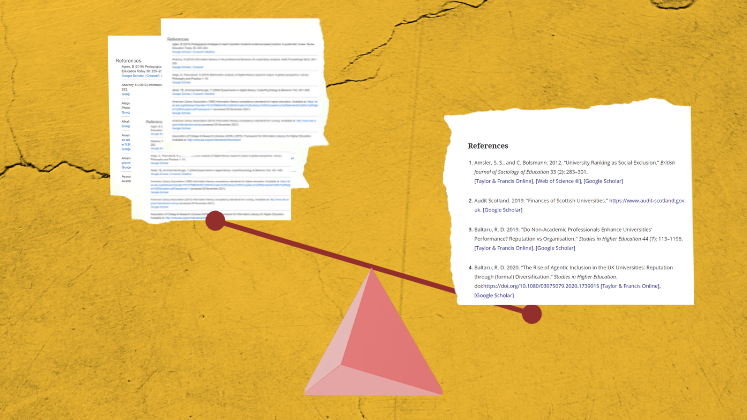Academia is often thought to function as a reciprocal gift economy, but do its methods and styles always work this way? Rachelle Chadwick draws on her recent research to consider what it means to take generosity as a serious academic position.
We normally think of generosity as an individual character trait. At first glance, generosity seems to have little to do with knowledge production or research. An act of generosity from a colleague or peer reviewer is nice to experience, but we do not tend to see such actions as linked to any specific knowledge paradigm. We are, however, comfortable with thinking about detachment and objectivity as core epistemic stances. Yet, just as objectivity describes a particular approach towards a research object, it is possible to think of generosity similarly as an orientation towards the others we encounter in research (persons, texts, ideas, or material objects). In a recent article, I drew on feminist scholarship that has challenged dominant understandings of critique as synonymous with antagonism, negativity, and interrogation, to suggest that there can be (and already are) other styles of critical engagement that are generous, caring, affirming, constructive. Building on this work, I propose the idea of epistemic generosity.
This is not meant as an exercise to pit one type of critique against another (deconstructive versus caring). Instead, following Eve Kosofsky Sedgwick, we should understand critical orientations as a fluid set of responses rather than a binary. What kind of critique is called for is situational and depends on context and political demands. Exploring generosity as an alternative mode of critical engagement is thus not meant to dismiss the importance of deconstructive critiques. It is however important to note that a generous orientation to knowledge, ideas, and research has typically been side-lined, devalued, and/or unrecognised in academia. Rather than encouraging wonder, surprise, uncertainty and listening, epistemic approaches have typically valorised instrumentality, neutrality, disengagement, linearity, and individualism. Furthermore, ‘critique’ and intellectual ‘rigour’ are often associated with adversarial and militant languages and responses.
a generous orientation to knowledge, ideas, and research has typically been side-lined, devalued, and/or unrecognised in academia.
Like many of us, this is certainly how I learnt to do ‘critical thinking’ as a university student. As I advanced through postgraduate study, I internalised the idea that success in academia and research meant staking an individual claim to knowledge, discovering or researching something new (finding a gap) and cleverly debunking the work of others (highlighting flaws, limitations, and errors). I was not well-trained in hermeneutical generosity, that is, acknowledging debts, building knowledge as a collective project, valuing deep and difficult reading, and non-directional listening. My whiteness also undoubtedly contributed to my comfort in accepting extractivist and territorial tools as markers of ‘critical thinking’. However, as time progressed, a sense of tension and discomfort arose between how I practiced research and writing, and my feminist principles and sensibilities. As a result, I began to reflect on what it might mean to read and write (and do critique) as a feminist scholar.

Building on the work of Virginia Woolf, Audre Lorde and Rosalyn Diprose, I explored what it might mean to practice generosity as an approach to knowledge production. When I speak of generosity in the context of academic research, I predominantly mean an orientation of open receptivity. To expand our thinking in new directions, we must be receptive to others. Epistemic generosity is a mode of response open to surprise, wonderment, and the difficulty of friction. It is open to not-knowing (or not having the answers). It is associated with a responsiveness which does not seek to foreclose or re-entrench solid categories. This openness to unpredictability results in inevitable risk: to be generous is inherently to be vulnerable. It can include moments of loss, estrangement, disappointment, violence, failure and trauma. The open hopefulness of generosity (that things can be different, that new understandings are possible, that the unexpected can be enriching and transformative) can result in trauma. In epistemic communities that value adversarial and individualist modes of relation, and in which knowing, and having ‘the answers’, is prized, the open receptivity and (slow) attentive stance of epistemic generosity is also at risk of being devalued, dismissed and marginalised. For example, Stone-Mediatore notes how university students often associate epistemic authority with those who exhibit intellectual arrogance, selfishness and lack of attention and care. At the same time, this is heavily gendered, with women and gender non-conforming academics often being punished (i.e., receiving negative evaluations) if they act in such uncaring ways.
to be generous is inherently to be vulnerable.
Ultimately, epistemic generosity is a hopeful and respectful openness towards other ideas, positions, persons, and problems. It involves being willing to let go of one’s own concepts and truths (even if temporarily) to listen and learn. Importantly, this kind of generosity does not necessarily mean accepting, condoning or agreeing with everything that the other says or believes. However, as a mode of open receptivity, practicing epistemic generosity involves the challenging work of remaining open to difference, difficulty, and friction. Ultimately it means a commitment to thinking rather than the easy repetition of accepted ideas (which often reproduce privilege) or a stubborn and defensive clinging to unexamined attachments and assumptions. Privileged persons are unfortunately prone to the latter. Comfortable social positions (and the desire to maintain them) often breed ‘willful ignorance’. This can be thought of as a kind of refusal to engage, recognise and attend to the oppression and injustice we inevitably encounter and contribute towards. For researchers shaped by experiences of privilege (especially whiteness), it is necessary to practise both constant suspicion (as far as possible) towards our own motives, assumptions and feelings and epistemic generosity towards others. As a result, practicing generosity in research means different things (and has different costs) for those located in different social positions.
My recent work is an attempt to think about the relations between critical thinking and generosity. For those of us who have become frustrated by the constant thrum of adversarial, militaristic and self-aggrandising forms of academic writing that seem to have become synonymous with ‘critical thinking’, it is important to recognise that alternative epistemic modes exist. ‘Epistemic generosity’ is one such modality. In the interests of struggling for the right to think (which is necessarily slow and often non-linear), to wonder and be surprised, to listen without extractivist intent, and to engage with (and think besides) others in a non-transactional way, we need to recognise and insist on the value of generosity to critical thinking and research.
This post draws on the author’s recent article, The question of feminist critique, published in Feminist Theory.
The content generated on this blog is for information purposes only. This Article gives the views and opinions of the authors and does not reflect the views and opinions of the Impact of Social Science blog (the blog), nor of the London School of Economics and Political Science. Please review our comments policy if you have any concerns on posting a comment below.
Image Credit: Still Life with Apples and a Pot of Primroses, Paul Cézanne, The Met (Public Domain).







